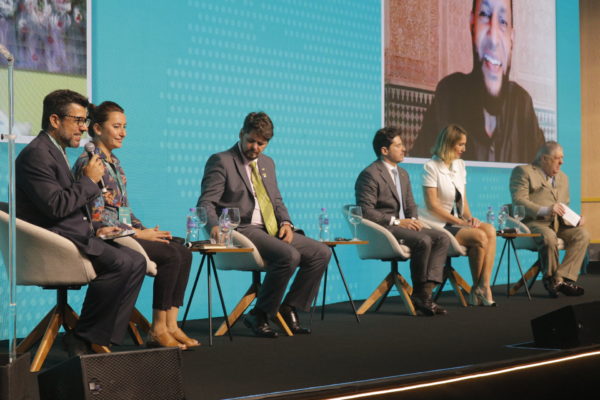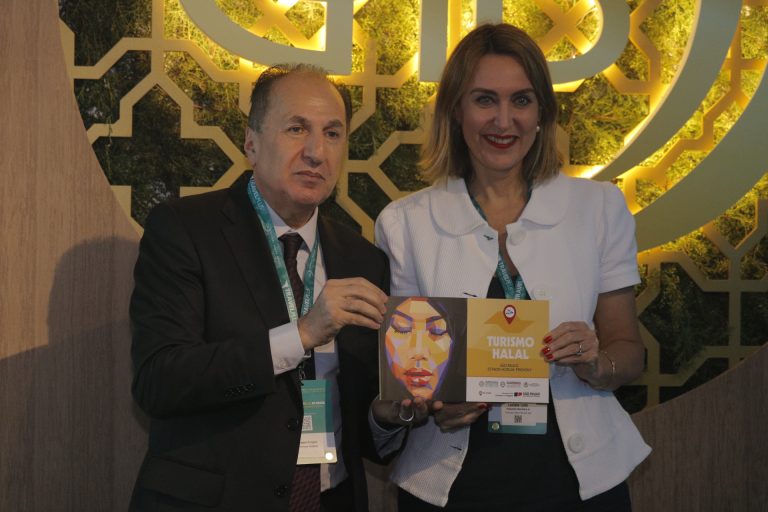São Paulo – Halal tourism is expected to grow as industry associations prepare to welcome Muslims. In Brazil, there are already some initiatives seeking to cater to Muslim travelers. On the panel “Tourism and Entertainment: Innovation and Competitiveness,” held on Tuesday (24) at the Global Halal Brazil (GHB) Business Forum in São Paulo, experts presented measures adopted so that tourism in both São Paulo and Brazil becomes Muslim-friendly. On the occasion, São Paulo state’s tourism executive secretary Luciane Leite received from the hands of the vice chairman of certifier FAMBRAS Halal, Ali Zoghbi, the halal guidebook launched in partnership between the São Paulo state government and FAMBRAS. The certifier is the organizer of the GHB together with he Arab-Brazilian Chamber of Commerce (ABCC).
According to Leite, the travel guidebook is an initiative by the state government to welcome and guide Muslim tourists. “If want to welcome them, we have to prepare the cities, we have to prepare the people. Our greatest challenge is to make the information get to the largest number of people as possible.” During her panel participation, Leite presented a video from São Paulo state’s tourism secretary Roberto Lucena.

Another Brazilian initiative to welcome and host Islamic tourists is in Paraná’s city of Foz do Iguaçu. Sharing a three-nation border with Argentina and Paraguay, it has large a Arab and Muslim population. According to Foz do Iguaçu tourism secretary André Roberto Alliana, 20% of the businesses in the city are Muslim-owned, including hotels, restaurants and stores. He said that there’s a promotion campaign of Foz do Iguaçu underway in Middle East countries.
Fernando Guinato, director of the Sheraton São Paulo WTC Hotel, where the GHB was held, said that one of the greatest challenges in implementing halal rules is overcoming deep-rooted customs and practices. Sheraton WTC got its halal certification earlier this year. “Ultimately you want to create an environment where they can feel at home, integrated.”
Fazal Bahardeen, CEO of CrescentRating, leading authority on halal tourism, pointed out tourism trends for the following years. “People will continue to seek immersive experiences. The traveler who wants purchases and tours will still be there, but the search for unique experiences is a trend,” he said, mentioning the use of artificial intelligence as a industry trend. JIA Trade & Healthy Food Marketing & Tourism CEO Ibrahim Abu-Helil pointed out that not all tourists are the same and that even within the halal rules, there are distinct patterns.
According to Brazilian Tourism Board (Embratur) institutional relations manager Nicolino Bozzella, tourism represents approximately 10% of Brazil’s gross domestic product and year to date through August, it grossed BRL 22 billion (USD 4 billion). “No other activity creates so many jobs and income while conservating the environment,” he said. The panel, which was moderated by journalist André Coutinho, also featured Turkish Airlines corporate sales senior executive Esra Serpen Coelho. “We start providing halal services even before they arrive at their destination. This is a very important aspect as a person who has never even eat halal starts to have contact with halal inside the plane,” she said.
The GHB is supported by the International Halal Academy, the Islamic Chamber of Commerce, Industry and Agriculture, the Union of Arab Chambers, and the Arab League, and it’s held in partnership with the Brazilian Federal Government, Ministry of Development, Industry, Trade and Services, Ministry of Foreign Affairs, and ApexBrasil.
Its sponsors are BRF, Marfrig, Minerva Foods, Laila Travel, Turkish Airlines, Embratur, Travel Plus, H2R Insights & Trends, World Logistic Passport (WLP), Bank ABC in Brazil, Seara, Pão & Arte, Cristal Plus, Pamunã Alimentos.
Read more about the GHB Business Forum.
Translated by Guilherme Miranda




